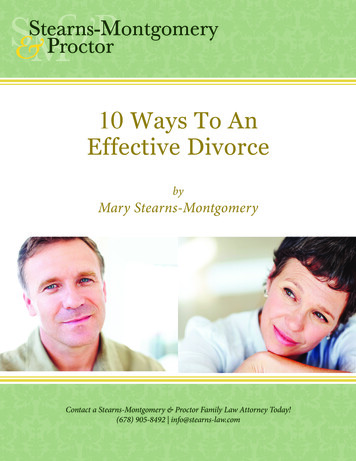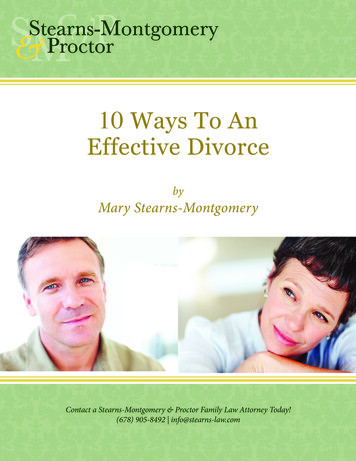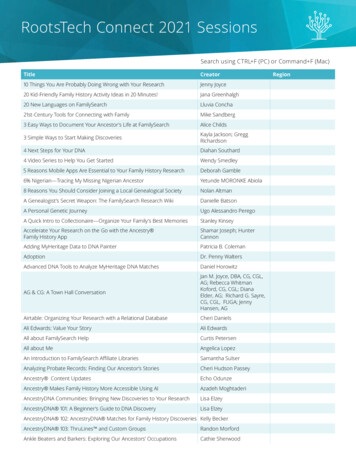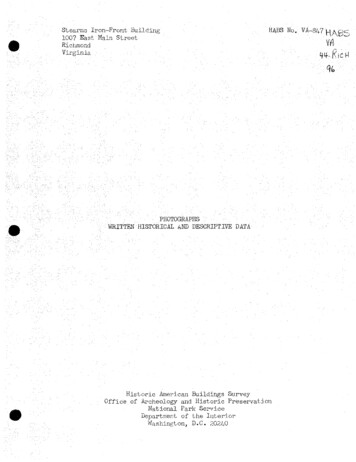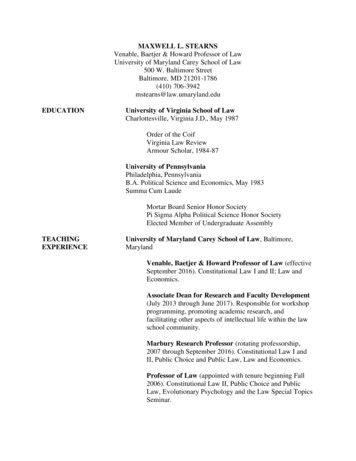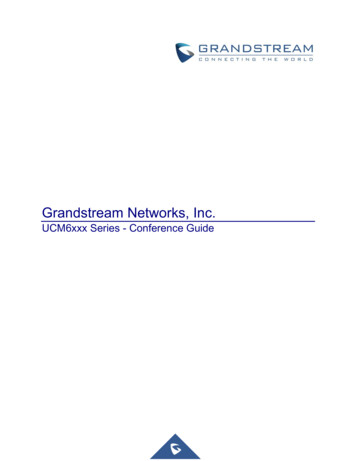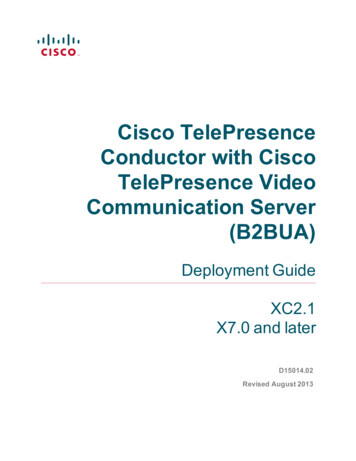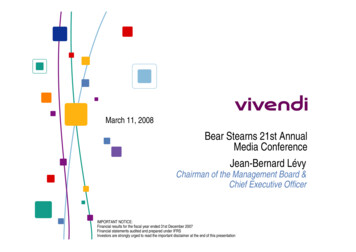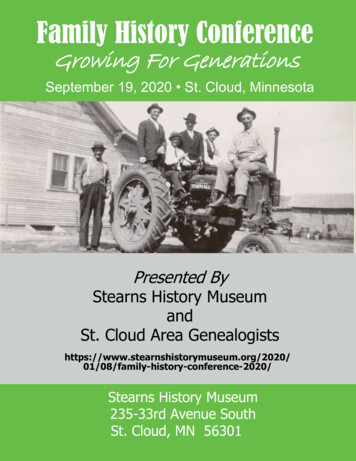
Transcription
Family History ConferenceGrowing For GenerationsSeptember 19, 2020 St. Cloud, MinnesotaPresented ByStearns History MuseumandSt. Cloud Area 020/01/08/family-history-conference-2020/Stearns History Museum235-33rd Avenue SouthSt. Cloud, MN 56301
Keynote PresenterKim AshfordKim Ashford is a professional genealogist fromMinnesota. She has a degree in Family Historyfrom Brigham Young University. Kim is a memberof several genealogical societies. She is a PastPresident of the Germanic Genealogy Society(MN) and is one of the founders and a currentboard member of the International GermanGenealogy Partnership.Keynote PresentationFamilySearch.org – A Place of LearningBeyond records, there are educational opportunities within the FamilySearchwebsite and offerings. Researchers often need to learn before they canfind. Discover more about the FamilySearch Wiki, tutorials, webinars, helpfeatures, and their YouTube channel and how each can assist you in learninghow to achieve your research goals.
Schedule8:30 a.m.9:00 a.m.9:15 a.m.10:15 a.m.10:45 a.m.11:45 a.m.1:00 p.m.2:00 p.m.2:15 p.m.3:15 p.m.3:30 p.m.Registration and ExhibitsWelcome and AnnouncementsKeynote: FamilySearch.org - A Place of LearningBreak and ExhibitsBreakout Sessions1. Finding Your Immigrant’s Home in Sweden2. Research Road Trips3. How to Use Family History DatabasesLunch and ExhibitsBreakout Sessions1. Polish Genealogy: Sources in America and Europe2. From Family Research Project to Published Book-One Writer’sJourney3. Utilizing Newspapers as a Research ToolBreak and ExhibitsBreakout Sessions1. Researching Former German Provinces in the East2. Leaving Your Legacy: Completing a Family History Book3. Facebook for GenealogistsBreak and ExhibitsBreakout Sessions1. Finding Immigration Records Online2. Tell Your Story: How to Sort, Digitize, and Share Collections3. Female Connections are the Best Road to Research SuccessExhibit at Stearns History MuseumYou are welcome to visit the museum exhibits during the conference.
10:45 a.m. to 11:45 ��——————Finding Your Immigrant’s Home in SwedenBy Robert JohnsonRoom: Gallery 2A common genealogical stumbling block is, not knowing, specifically, where your immigrant ancestor camefrom in Sweden. Using lecture and examples, we will review the numerous U.S., Swedish, and other relevantgenealogical resources to understand the research methodology to help you find your immigrant’s place oforigin in Sweden.Research Road TripsBy Nathan MachulaRoom: Gallery 3While genealogy research has become far easier with online resources, only a tiny fraction of records havebeen digitized. Researching where your ancestors lived can reveal unique records that do not exist anywhereelse, and walking the same ground they did can shed light on their lives. Combine research, education, andrecreation into one trip. Learn how to plan and prepare for research trips, whether a day trip to the nextcounty or a week-long multi-state excursion.How to Use Family History DatabasesBy Mary WickershamRoom: Board RoomThe availability of family history information on the Internet continues to grow quickly. Learn techniques tofind online databases using search engines and catalogs, followed by creative ways to use search tools tofind results once you find the database you want to search.1:00 p.m. to 2:00 p.m. �——————Polish Genealogy: Sources in America and EuropeBy Jerome (Jay) BiednyRoom: Gallery 2This is a high-level review of most record types you would encounter while doing research on a PolishAmerican relative. Vital records in America and Poland will be discussed and many examples given.Specialty sources including aids to finding the ancestral village will also be discussed. Immigration andnaturalization documents will be covered along with other lesser used documents.From Family Research Project to Published Book-One Writer’s JourneyBy Joy RiggsRoom: Gallery 3In 2006, Joy Riggs offered to help her dad research the career of his paternal grandfather, a longtimeSt. Cloud band director. Using genealogy resources and her journalism skills, she uncovered a wealth ofinformation that ultimately led to her writing a nonfiction book about her musical ancestors.Not everyone wants to write a book about their family history. But every family has stories that should bedocumented for future generations. Joy will discuss the path she traveled and provide researching,interviewing, and writing tips that will help you create engaging family history accounts others will want toread.Utilizing Newspapers as a Research ToolBy Shaunese LuthyRoom: Board RoomNewspapers are an effective research tool for all skill levels when conducting genealogy. Researchingnewspapers are especially useful when searching for additional clues to records. This specific resource offersvaluable information regarding, but not limited to: obituaries, death notices, marriage announcements,migration lists and other news. This session includes specific strategies for exploring newspapers includingbut not restricted to: the area of the newspapers, the availability of newspapers, key terms to use, theaccessibility of online newspapers and more. The importance of newspapers, use of newspapers in researchmethodology, and incorporation of useful data will also be discussed.
2:15 p.m. to 3:15 ��———————-Researching Former German Provinces in the EastBy Nathan MachulaRoom: Gallery 2Many German and Polish immigrants to Central Minnesota came from places then in Germany, but now inPoland. These ancestors can be difficult to research, since many of the place names have changed and therehas been substantial record loss. Discover resources and strategies for researching former provinces east ofmodern Germany. Find places with names now in other languages. Learn what records are available andhow they can be accessed. Expand your family history beyond names, dates, and places, by putting yourancestors’ lives into context.Leaving Your Legacy: Completing a Family History BookBy Brendon DuffyRoom: Gallery 3Have you considered producing a family history book, but think the task is too daunting? Are you waitinguntil your family research is “finished”? Brendon Duffy will share some learnings from his two-year projectthat took five years. We’ll explore formats, costs, writing tips, project plans and outsourcing options. Andbring your questions. Perhaps his lessons learned the hard way will provide some short cuts for you andinspire you to do a project of your own!Facebook for GenealogistsBy Kim AshfordRoom: Board RoomYou can use Facebook to connect to family, research experts, translation assistance, help with your softwareprogram, archives, genealogy organizations and many more! Learn the terms groups, pages, private, hidden,etc. and how you can use Facebook to your advantage in your research.3:30 p.m. to 4:30 ��——————-Finding Immigration Records OnlineBy Mary WickershamRoom: Gallery 2Explore how to find immigration records - naturalization records and ships’ manifests – in online databases.Examples include Ancestry.com, Ellis Island and Castle Garden (New York) and Steve Morse’s special searchforms for efficient searches of ships’ records, which cover New York and many other United States ports ofarrival.Tell Your Story: How to sort, digitize, and share collectionsBy Hannah King, Naomi Skulan, Angela StanglRoom: Gallery 3Have you wanted to share your family history online, but making a website seems out of your league? Thissession will introduce the techniques and skills needed to help genealogists and family historians create aclear story from their work and make that story easily accessible online. The presenters will also share lessons learned from previous workshops and how other organizations can implement the program. Ideal forindividuals who want to expand their options and organizations that want to help their community sharetheir stories.Female Connections are the Best Road to Research SuccessBy Kevin CassidyRoom: Board RoomThis presentation details what researchers must do to maximize the knowledge provided by their femalefamily members over the years. The talk takes researchers from what they know to asking relatives and thenresearching records. Strategies and records sets are discussed at length to develop the fullest possiblepicture of their family story. This presentation includes examples of records that researchers will findnecessary in their pursuit of their roots. Topics include: Widows, spinsters, divorce records, poor houserecords, cookbooks, quilts, voting records,1922 Cable Act.
About Our SpeakersJerome (Jay) BiednyJerome (Jay) Biedny has been active in the Polish Genealogical Societies of Minnesota, New York and America for over 30 years. He held many Board positions with PGSmn including president and has presented onthe topic of Polish genealogy and immigration at several local and regional events. Jay specializes in Polishrecords from the German and Austrian Partitions and on the ocean liners that brought his family to America.He authored a genealogical column for many years in a Polish language paper in Minnesota. He is currentlyworking on a book that will capture his decades of research.Kevin CassidyKevin Cassidy is an avid researcher and lecturer on genealogy topics. He has searched his own family treeback to the 8 Irish townlands of origin for his great-grandparents since 1994. Kevin has also had severalpieces published in newsletters and genealogy magazines including Family Chronicle, Internet Genealogyand Your Genealogy Today. His talks are research and strategy centered. Each family tree is unique to itselfand he encourages researchers with a plethora of examples and research approaches that will advance theirown research goals. He has history and law degrees and a diploma in family history.Brendon DuffyOn a family trip to his grandfather’s hometown in Ireland when he was seven years old, Brendon Duffy fell inlove with genealogy. He has been working on all aspects of family history—both his own and others’—eversince. Brendon has been a professional writer and editor and is currently the archivist at the St. Cloud Hospital. He earned his Certificate in Genealogical Research from Boston University in 2018. His wife and threechildren keep him accountable for spending as much time with living relatives as dead ones.Robert JohnsonBob Johnson is an attorney and holds a Certified Genealogist credential. As a professional genealogist hehas specialized in Scandinavian, U.S., German, and forensic genealogical research for over forty years. Hestudied in Sweden and is active in many genealogical societies throughout the U.S. and Scandinavia. He currently is a Director on the Board of the Minnesota Genealogical Society and is the chair of the Society’s Education Committee.Hannah KingHannah King is the Curator/Volunteer Coordinator at the Wright County Historical Society in Buffalo, MN.She is interested in increasing museum accessibility through programs and digital resources.Shaunese LuthyShaunese Luthy earned her Associate’s Degree in Family History from Brigham Young University – Idaho andher Bachelor’s Degree in Family History and Genealogy from Brigham Young University. Her research areasare focused in the: Dakotas Regions, Central Plain Regions, Midwest/Great Lake Regions, Mountain West Region, and LDS Records. Shaunese has given different presentations on using newspapers to build an ancestral biography at the Riverton Family History Library, in Riverton, Utah in 2018. In 2019, at the APG Professional Management Conference, she delivered a poster presentation of how to create instructional videos.Shaunese is the owner of Untangle Your Roots.Nathan MachulaNathan Machula is originally from Sauk Rapids, but now a professional genealogist in Salt Lake City, specializing in German, Scots-Irish, and DNA research. He has researched his family history for more than 25 years,earned degrees in history and engineering from the University of Minnesota, and completed 13 week-longgenealogy courses at GRIP, SLIG, IGHR, and the British Institute. He has lectured at local, regional, and international genealogy conferences.Joy RiggsJoy Riggs is the author of Crackerjack Bands and Hometown Boosters: The Story of a Minnesota Music Man(Nodin Press, 2019). She grew up in Alexandria, Minnesota, and graduated from Drake University in DesMoines, Iowa, in 1990 with a bachelor’s degree in news-editorial journalism. She specializes in writing abouthistory, travel, and parenting. Her award-winning columns, essays, and articles have appeared in numerouspublications, including the Star Tribune, Minnesota Parent, Minnesota Monthly, and the Des Moines Register.She lives in Northfield, Minnesota. For more of her writing, visit www.joyriggs.com.
Naomi SkulanNaomi Skulan is the Metadata and Technical Services Coordinator at the University of Minnesota, MorrisRodney A. Briggs Library. She is also the coordinator for UMM’s Digital Well and Digital Collections.Angela StanglAngela Stangl is a librarian and the Digital Services Coordinator at the University of Minnesota, Morris Rodeney A. Briggs Library. She is interested in all types of technology and frequently helps troubleshoot challenges with all types of users.Mary WickershamMary Wickersham is a longtime member of the Minnesota Genealogical Society and a past director and officer of MGS and the Irish Genealogical Society International (IGSI). She has over 15 years’ experience as aprofessional genealogist, is a member of the Association of Professional Genealogists, and is a foundingmember of the MGS research group. She has given talks for Minnesota, Iowa and Wisconsin Historical andGenealogical Societies and, IGSI. Her website is www.mw-ancestor.comConference SponsorsStearns History Museumwww.stearns-museum.orgFounded in 1936, the Stearns History Museum has been preserving and interpreting the history of the region for 81 years. Its mission is to connect people to the power of history and culture by collecting, preserving, and interpreting our historical and cultural resources. It also is nationally accredited by the AmericanAlliance of Museums.St. Cloud Area Genealogistswww.stearns-museum.org/genealogy-orgA non-profit organization that strives to make your family history research an enriching and rewarding experience. Our monthly meetings include guest speakers who provide educational presentations to teach waysto prepare a research plan, how to evaluate evidence, techniques to discover online and non-digitized resources, and so much more.The premier organization is for everyone from the beginner to the most advanced family historian. Ourmembers research their ancestors from varying locations within Minnesota, throughout the United States,and from foreign countries.Whether you have Minnesota connections or not, we invite you to join us in pursuit of your family history. Joining our organization is a great way to propel your research forward and for connecting with a network of people who share your interest in family history.WIFI InformationWIFI Password: Stearns15
Event SponsorCentral Minnesota Library ExchangeEvent DonatorsAncestryBernick’s Bottling CompanyKathy SauerSpecial Thanks toConference Planning CommitteeMichele Braun-HeurungRuth LarsonReggie MohsSteve PenickKathy SauerDan SchroederMarilyn StinsonJessie StorlienPat Quinn
Exhibit at Stearns History Museum You are welcome to visit the museum exhibits during the conference. 8:30 a.m. Registration and Exhibits 9:00 a.m. Welcome and Announcements 9:15 a.m. Keynote: FamilySearch.org - A Place of Learning 10:15 a.m. Break and Exhibits 10:45 a.m. Breakout Sessions 1. Finding Your Immigrant's Home in Sweden 2.
